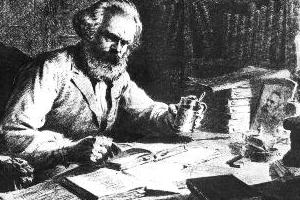

|
Study Guide for |
(1) - Introduction
Terms and People: Production and Consumption, Adam Smith, David Ricardo, Rousseau, Civil Society, Individualism, Feudal Society, Society, Proudhon, Subject and Object, Economics, Capital, Property, Particular.
Questions for discussion:
1. How do the political economists use the Robinson Crusoe story, and what is their mistake?
2. Can you think of other examples of people projecting an ideal into the past in order to explain or justify the present?
3. The political economists begin their consideration of production by defining what is common to all production. On what basis does Marx criticise this approach?
4. In what sense could we say that production is the outcome of an historical development, not the point of departure or posited by Nature?
(2) - Production, distribution, exchange & consumption
Terms: Distribution and Exchange, Objectification, Exchange, Mediation, Syllogism, Universal, External and Externalisation, Objective and Subjective, Means of Production, Negation, Economics, Immediate, Identity, Productive and Unproductive Labour, Means and Ends, Unity of Opposites, Class, Capital, Wages, Rent, Wage Labour, Division of Labour, Nature, Slave Society, Private Labour, Analysis.
Questions for discussion:
1. In what sense is production consumption?
2. In what sense is exchange distribution?
3. In what sense is consumption production?
4. Marx says it is “not that production, distribution, exchange and consumption are identical, but that they all form the members of a totality, distinctions within a unity”, but that production dominates. On what basis does Marx argue that production rather than distribution or exchange dominates?
5. What is the social and ideological basis for the separation from each other of the concepts of production, consumption, distribution and exchange?
6. What sort of conclusions follow from considering distribution and production separately from one another?
(3) - The method of political economy
Terms: Reality, Abstract and Concrete, Notion (Begriff), Being, Essence, Observation, Subject and Object, Money, Labour, Feudal Society.
Questions for discussion:
1. Describe how you might write a book about your own city (the city you know best) “beginning from the population, its distribution, etc.”, and the sequence of the different chapters, etc.
2. Describe how you might write the same book for the local tourist board. How would it differ?
3. Describe how you write this book in the form of a treatise on local history.
4. Describe how you might the same book as a sociologist, beginning with a definition of what kind of city this is, and then successively elaboating on this idea.
5. Describe how you have come to know this same city in your own life. Which book would you have been best able to write as a youngster? and which book would require the best knowledge of this city? Which book would give a visitor the best understanding of this city
6. What does Marx mean by “Human anatomy contains a key to the anatomy of the ape”?
7. “The method of rising from the abstract to the concrete is only the way in which thought appropriates the concrete, reproduces it as the concrete in the mind. But this is by no means the process by which the concrete itself comes into being” What is, by constrast then, the way in which the concrete comes into existence?
8. In reference to money Marx says “To that extent the path of abstract thought, rising from the simple to the combined, would correspond to the real historical process”. What did Marx mean here?
9. What does Marx mean by: “The simplest abstraction, then, which modern economics places at the head of its discussions, and which expresses an immeasurably ancient relation valid in all forms of society, nevertheless achieves practical truth as an abstraction only as a category of the most modern society”?
10. Eventually, when Marx wrote Capital, he started not with these general categories - production, consumption, distribution, etc., but with the commodity relation. Why?
(4) - Forces of production, relations of production & circulation
Terms: Productive Forces, Relations of Production, Circuit of Capital, Critique, Law, Materialism, Chance, Grand Narrative, Religion, Truth.
Questions for discussion:
1. Can you think of more recent examples of how war and the war industries have anticipated developments in civilian industry?
2. What does Marx mean by “World history has not always existed”?
3. Can you apply Marx's observation about early (e.g., Greek) art to socialism?
4. What do these observations by Marx tell you about the Art of our own day?
5. Do Marx's observations about the pleasure we still get from Greek art (well, Marx did anyway) make you think of in terms of the cinema these days?
6. What did Marx mean by “the concept of progress not to be conceived in the usual abstractness”?
Andy Blunden, 2002